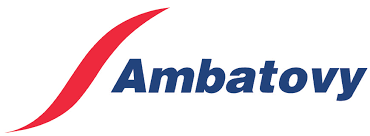- FREE DELIVERY ON ORDERS OVER £100
- NEXT-DAY DELIVERY WITH ORDERS BEFORE 12 noon
- FAMILY BUSINESS
- FREE DELIVERY ON ORDERS OVER £100
- NEXT-DAY DELIVERY WITH ORDERS BEFORE 12 noon
- FAMILY BUSINESS
Bullseye Holiday Trading 2023
Bullseye Holiday Trading 2023
The task of delivering up to five thousand meals every day for those doing one of the toughest jobs on the planet has been transformed with a simple switch to a sustainable new meal delivery tray from British company Bullseye Food Packaging. And this revolution in food quality and service is not taking place in the UK but on the Indian Ocean island of Madagascar where the $5bn Ambatovy mining project is set to become the world’s biggest nickel mine.
The step change in food service has come about because those behind the Ambatovy project believe in a wider vision than just mining, refining and walking away. They know that Madagascar, the fourth largest island on earth, is not just a source of precious metals but has a unique environmental habitat with 90% of its plant and animal species found nowhere else on the planet. This is why the project backers are committed to contributing to sustainable development in Madagascar far into the future and long after they have left. What is surprising is that the sustainability commitment runs through to the smallest detail including adopting eco-friendly meal trays for the 1700 workers who need a healthy, nutritional meal three times a day.
As Peter Prior of Bullseye explains, “Miners work hard and deserve good food. When we were first approached for this project we identified a number of issues preventing not just a sustainable meal delivery but also affecting the quality of food and presentation. The old-fashioned burger-style plastic food trays they were using not only meant meals got cold quickly but were also difficult to transport and food became quickly messy and mixed together. Our tailored solution solved all these issues at once.”
Bullseye trays are made from eco-friendly paper pulp and the separate compartments sealed with film lids mean that food such as a typical three course lunch of meat, rice, salad and dessert can be delivered to even the remotest parts of the mine without affecting quality and presentation. In addition, before the new trays were introduced it was not possible to include sauces or juices with food as these would run into other courses in transit. Now the meals, which are freshly made and packed in a central kitchen, can be sealed, stacked and shipped to mine workers without the problems of the past and with the big advantage that the used paper pulp trays can then be separated for recycling.
It was Ambatovy Camp Superintendent Andrew Sumich who took the initiative to look for a better way to deliver packed meals to the plant and mine workers. “We had a problem with our packed meals which is mirrored throughout the global mining community. Meals were often delivered late, cold and were very poorly presented. I’ve worked in many large mines around the world and I have never been truly able to resolve this problem until now”, he said. Andrew found Bullseye on the internet and asked them to present a solution tailored to the Ambatovy mine.
Also critical in the success of the switch to Bullseye trays was French-based caterer at the site – Newrest – a global leader in multi-sector catering with more than 23,000 employees around the world. With up to 1400 packed meals, three times a day, going to the Toamasina mine itself and a further 300 to workers at the project’s refining plant, Newrest was keen to uphold the standards it had set in other sectors such as airlines, healthcare and education. It recognised though, that however high the quality of cooking, there were limitations placed on food quality by the previous packaging and delivery method. Newrest’s Country Manager for Madagascar Pierre Maartens said: “Andrew asked us to work with Bullseye to deliver the new packed meal solution. So we developed a new range of menus especially created for the new packaging. Bullseye worked directly with us to install the sealing machines, train the operators and organise the distribution process with insulated bags which they had created especially for us.”
Since Bullseye’s paper-based meal trays launched in the UK nearly 15 years ago, the family business has captured markets in sectors ranging from care homes and meals-on-wheels to prison cells and environmentally conscious ready-meal makers. But the global reach of their web site is what led to the enquiry for a solution in Madagascar and the interest now goes even further. “What we achieved in Madagascar we have now replicated at another large industrial operation in Mongolia”, says Peter. “Suddenly even the most remote corporate operations are seeking the greenest route to feeding their employees and helping improve food quality as well.”

